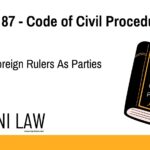Code
CPC In lieu of issuing a commission the Court may issue a letter of request to
examine a witness residing at any place not within1[India]
Here’s the ApniLaw-style article section for the CPC provision you shared about letters of request for examination outside India:
CPC – Letter of Request to Examine Witnesses Abroad
Code Text (Formatted)
In lieu of issuing a commission, the Court may issue a letter of request to examine a witness residing at any place not within India.
Explanation
This provision allows Indian Courts to obtain evidence from witnesses who are outside India.
- Purpose:
Ensures that witnesses who live abroad can provide testimony without physically coming to India, while preserving the legal validity of the evidence. - Difference from a Commission:
- A commission is issued to a Court within India.
- A letter of request is directed to foreign authorities or courts to examine witnesses abroad.
- Legal Basis:
Such requests are typically executed in accordance with:- Reciprocal arrangements with the foreign state, or
- International treaties, where applicable.
- Procedure:
- The Indian Court drafts the letter of request, specifying the witness, purpose, and questions.
- The letter is sent to the foreign Court or authority empowered to record evidence.
- Evidence recorded abroad is sent back to the Indian Court to be used in the case.
Illustration
- Business dispute: A witness to a commercial transaction resides in London.
- The Indian Court issues a letter of request to a competent Court in the UK.
- The UK Court records the witness statement according to local procedures.
- The recorded statement is returned to the Indian Court and forms part of the evidence.
- International family law case: A witness to a property settlement lives in Dubai.
- Indian Court sends a letter of request.
- Evidence is recorded in Dubai and sent back for use in the Indian proceeding.
Common Questions & Answers
Q1. Why use a letter of request instead of a commission?
👉 Because a commission can only be issued within India. Witnesses abroad require international cooperation, hence a letter of request.
Q2. Can the foreign authority refuse to execute the request?
👉 Yes. Execution depends on local laws and international treaties between India and that country.
Q3. Is the evidence recorded abroad admissible in India?
👉 Yes, if the procedure complies with Indian law and the foreign authority’s legal standards.
⚖️ Conclusion:
This provision ensures that Indian Courts can effectively gather evidence from witnesses outside India, maintaining judicial efficiency in cases involving international parties or events.








